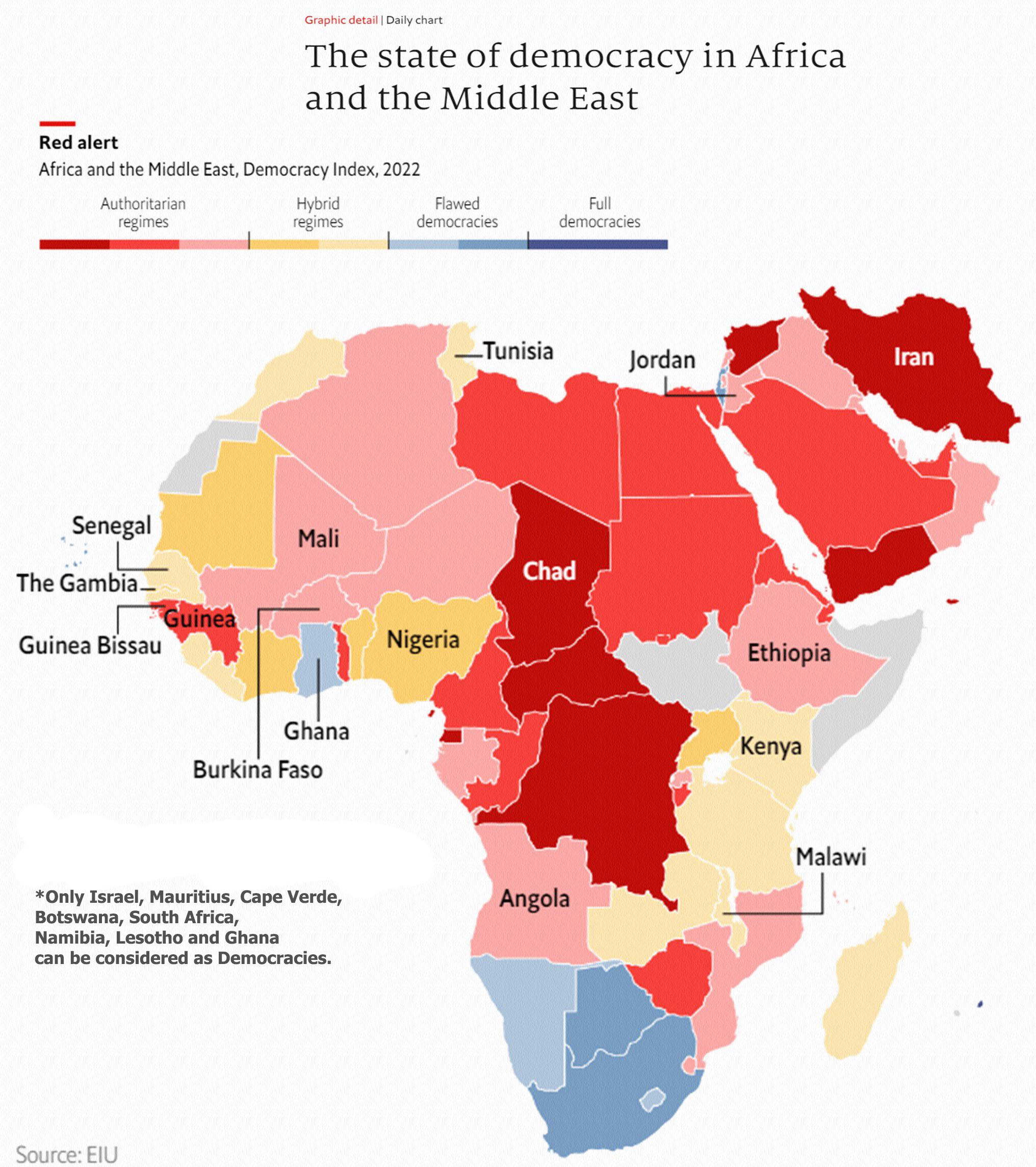Francophone Africa: Democracy in Retreat
August 5, 2023 | Expert Insights

The recent coup in Niger is the latest in a series of military takeovers that have shaken Francophone Africa in recent years. In the past two years, erstwhile French colonies and other important regional countries have seen their democratic rulers sent packing by military junta- Mali, the Central African Republic, Sudan, Burkina Faso, Guinea-Bissau, Guinea, and the Gambia.
This recent spurt of coups is a worrying trend, raising serious questions about the future of democracy in Francophone Africa.
Background
On July 27, 2023, a group of soldiers in Niger staged a coup d'état, overthrowing the democratically elected government of President Mohamed Bazoum. The coup was led by Colonel Mamadou Sani, who announced on national television that the constitution had been dissolved and that the military was now in control of the country. President Mohamed Bazoum elected in April 2021 had already faced a failed coup earlier. This time around, his own presidential guard ensured the coup succeeded, and the President remains alive but in military custody.
After a tepid response to most of the earlier coups, the response to the latest Mali coup has been vociferous, both from the regional Economic Community of West African States (ECOWAS) and the international community, including the UN, the EU, the AU and U.S. and France. In an unprecedented step, the ECOWAS, clearly with the nod of the U.S., France and the AU, has threatened the coup leaders with a military response if the democratically elected President was not reinstated within a week.
From visuals on social media and international TV channels, the ground-level support for the coup is visible, although it is not clear how much has been engineered by the military. The fact remains that in most countries in Africa that have seen a coup in the recent past, the democratically elected civilian government were mired in corruption and nepotism and did not do much credit to their democratic credentials. Of course, as per French sources, President Bazoum was a progressive and democratic ruler.
The coup leaders have not yet released a detailed plan for their rule, but they have said that they are committed to holding democratic elections in the future. However, it is unclear whether they will be able to restore stability to Niger or whether the coup will lead to further violence and instability in the region.
Francophone nations in Africa have been grappling with a concerning trend of military coups, eroding democratic institutions and principles. From Mali, Central African Republic (CAR), Sudan, Burkina Faso, and Guinea Bissau to Guinea and Gambia, the region has witnessed a spurt of coups over the past two years.
One must delve into the historical legacies that shaped these countries' political landscapes to comprehend the prevalence of coups in Francophone Africa. The colonial past, characterized by extractive governance and authoritarian rule, left a lasting impact on their institutions and statecraft. Upon gaining independence, many countries were ruled by strongman leaders who concentrated power and stifled opposition. This legacy of authoritarianism and lack of democratic institutions laid the foundation for recurrent political instability. In most cases, these authoritarian rulers had the blessings of France, and in some cases, French Foreign legionnaires occupying military bases in their countries lent force to the support.
Further, the rise of armed groups in the region. These groups, often motivated by religious extremism or ethnic separatism, have created widespread insecurity and instability. France, U.S. and the UN, and now the Russians, through their Wagner Group, have been involved in stiffening the military spine of these nations afflicted with Islamic insurgencies but apparently have failed. Most countries have witnessed the departure of the UN peacekeepers and trainers from Western militaries.
The recent coup in Niger is a reminder that democracy is fragile in Francophone Africa. It is important to address the underlying factors contributing to this decline, such as insecurity and corruption. Only by doing so can the region hope to reverse this worrying trend and build a more stable and democratic future.

Analysis
The fragility of democratic institutions in Francophone Africa has made them susceptible to manipulation and capture by powerful elites. Political patronage and the control of state resources have often overshadowed the principles of democratic governance. This environment fosters a culture of impunity, where leaders are not held accountable for their actions, undermining the rule of law and the democratic process.
People in Francophone Africa feel that their governments are corrupt, inefficient, and unresponsive to their needs. This has led to a loss of faith in democracy and has made it easier for military leaders to seize power.
The interference of external actors, including former colonial powers, regional organizations, and global powers, has significantly impacted the region's democratic trajectory. External actors sometimes have propped up autocratic regimes for strategic interests, undermining democratic forces seeking reforms. This interference has created tensions and instability within these countries, paving the way for military coups to challenge established power structures. As France clings onto its colonial legacy with these countries through its overbearing military presence, it acts as a magnet drawing people’s frustration for the shortcomings of their own leaders.
The prevalence of security challenges, such as terrorism and insurgencies, has posed a significant threat to stability in Francophone Africa. Armed groups exploit weak governance and institutional deficiencies to advance their agendas, making it difficult for democratic institutions to function effectively. In response, some military factions have used coups as a supposed solution to address these security threats, exacerbating the cycle of political instability.
A significant youth demographic characterizes many of these nations. Youthful populations often struggle with high unemployment rates, limited opportunities, and a sense of political disillusionment. As they perceive the traditional political elites as unresponsive to their needs, some young people resort to extra-constitutional means like supporting military coups as a potential catalyst for change.
The rise of social media and increased accessibility to information have played a dual role in the recent surge of coups in Francophone Africa. While social media has been instrumental in mobilizing citizens and fostering collective action, it has also become a platform for misinformation and disinformation, further polarizing society and contributing to political tensions. This is most evident in Senegal, where social media remains suspended after an ongoing political turmoil triggered by the conviction of a popular opposition leader, Ousmane Sonko, on alleged rape charges.
Assessment
- The spurt of coups in Francophone Africa highlights the complex challenges that democratic governance faces in the region. Historical legacies, economic disparities, weak institutions, and external actors' interference are some contributing factors to this unsettling trend.
- Addressing the root causes and promoting democratic values that empower citizens and enhance institutions are vital steps in reversing the democratic retreat in these nations.
- A comprehensive approach that involves meaningful dialogue, inclusive governance, and sustainable socio-economic policies is crucial to ensure a stable and democratic future for Francophone Africa. Only then can the region break free from the cycle of political coups and pave the way for a brighter democratic tomorrow.








Comments